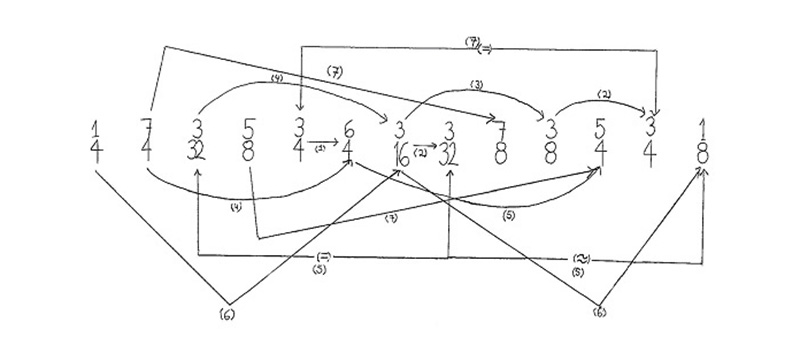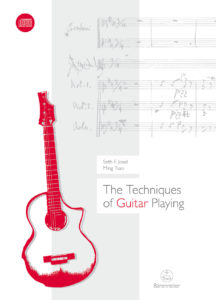
Ming Tsao, “Metric Scheme”, from “Fragments of a Compositional Methodology”, Search Journal for New Music and Culture, Winter 2008
Link to writings: hmtm-hannover.academia.edu/MingTsao
Articles
“Towards a Materialist Musical Expression”, MusikTexte 175 (November 2022), 34–41
“What do composers do all day?”, MusikTexte 173 (May 2022), 17
Music Composition Today, Revista Vórtex Vortex Music Journal, v.8, n.1, p. 1-10, 2020
Abstract: In this essay, composer Ming Tsao presents a critical overview of today’s new music scene, with a special emphasis on the task of teaching music composition today and the culture of new music festivals. Tsao’s main critique delves into the current tendency towards entertainment predominantly displayed in some German new music festivals, commonly advertised as experimental music. Alongside this critique, Tsao presents Steven Takasugi’s musical theater work “Side Show” (2009-15) as an example of today’s music composition that resists this emerging commercialism in concert music. In this text, Tsao makes reference to the writings and ideas of German composer Helmut Lachenmann, mainly on his concepts of Geräuschmusik, Kadenzklänge, Texturklänge, and the language-like aspects of music, as well as to the writings of poet J. H. Prynne [note by editor].
Diesseits und Jenseits der Gartens: zum Musiktheater Ming Tsaos, Musik & Ästhetik 22, 2/2018: 49–62
This Side and the Other Side of the Garden: The Music Theater of Ming Tsao
Abstract: Ming Tsao’s music theatre work Prosperos Garten is based on Shakespeare’s The Tempest and deals with colonial power relations as created and consolidated through language, and through associated elements of abstraction. Tsao realizes this language-critical interpretation of The Tempest with an aesthetic that, through reverse transcriptions of pre-existing historical material and complex structural sounds, integrates dissociated musical fragments, and thus also fragments of music-cultural perceptions, into the composition, interweaving them and bringing them into contact through layers of different sonic contexts. In this manner, he strives to open up possibilities for polyphonic musical subjectivity and expressivity beyond dichotomous representations.
“What is Speculative Music Composition?”, PARSE Journal #7, Speculation Issue, 2017: 45–62
Abstract: One of the challenges of contemporary music composition is to speculate upon “possible worlds” as a counterpoint to our contemporary understanding of place, where the lyrical impulse in music is sensitive to relations between human impact and presence in the more-than-human world. Such sensitivity arises from a compositional superfluity where subjectivity is “dislocated presence” for new modes of perception to appear that resist representation, conceptualisation, enframing, quantification and instrumentalisation. Music composition today should ask listeners to listen beyond anthropocentric terms, including the ways in which the resistance of the world—its conflicting and dynamic materiality—exceeds both conceptual thought and technological control. This “speculative turn” in music composition is indeed not to excise music’s resemblance to language, and by extension music’s capacity for expression, but to decentre music’s humanised expression from its privileged position for the possibility of a music independent of from language, thought and intentions, where music’s materiality can exceed human agency. Such music would suggest a critical materialist sound—a sound world outside of consciousness rather than a sound world fully endowed with consciousness, thus placing the listener in a space where they are required to rethink their personhood within a larger domain of life.
“Dialektisk komposition”, Nutida Musik, NR 267–268, 2017
“Mein Shakespeare-Moment”, A Party for Will! A Journey into the Shakespeare Universe (edited by Petra Hesse and Peter W. Marx), Cologne: Theater der Zeit, 2014: 195
“Fragments of a Compositional Methodology”, Search Journal for New Music and Culture (Winter 2008: 1–15)
Books
Helmut Lachenmann (Critical Guides to Contemporary Composers) (with Camilla Bork), Bristol: Intellect Books, forthcoming
Ming Tsao – Mudan ting: Ein Gespenst geht um in China, Reinventing opera in the 21st century (with Patrick Primavesi, Ute Holl, Camilla Bork and Hans Thill), Germany: Wolke Verlag, forthcoming 2026
The Techniques of Guitar Playing (with Seth F. Josel), Kassel: Bärenreiter Press, 2014
Download excerpt | Get a copy
 Abstract: This book by pioneering guitarist Seth F. Josel with composer Ming Tsao is dedicated to the presentation and explanation of contemporary guitar techniques. Relying on extensive use of tables, charts and musical examples as well as an accompanying CD, various novel techniques ranging form multiphonics to percussive actions are discussed in detail, including the analysis of salient passages from the literature of the 20th and 21st century. What is unique about this book is the historical contextualization of each technique along with discussions around the orchestration of the guitar in chamber and orchestral musical settings.
Abstract: This book by pioneering guitarist Seth F. Josel with composer Ming Tsao is dedicated to the presentation and explanation of contemporary guitar techniques. Relying on extensive use of tables, charts and musical examples as well as an accompanying CD, various novel techniques ranging form multiphonics to percussive actions are discussed in detail, including the analysis of salient passages from the literature of the 20th and 21st century. What is unique about this book is the historical contextualization of each technique along with discussions around the orchestration of the guitar in chamber and orchestral musical settings.
Abstract Musical Intervals: Group Theory for Composition and Analysis, Musurgia Universalis Press, Berkeley, CA., 2010 (2000) (ML3809 .T73)
Download excerpt | Get a copy
 Abstract: This book is an introduction to GIS (Generalized Interval Systems) theory that includes the major results of pitch-class theory. It provides mathematicians with applications of group theory to music and music theorists with the essential connections between GIS theory and pitch-class theory. Many of the results in pitch-class theory are not addressed by David Lewin (such as power functions or the Common Tone Theorem for inversions). The book states those results and generalizes them to conform with GIS theory. Finally, it addresses recent criticisms leveled at pitch-class theory and suggests how they can be addressed in GIS theory.
Abstract: This book is an introduction to GIS (Generalized Interval Systems) theory that includes the major results of pitch-class theory. It provides mathematicians with applications of group theory to music and music theorists with the essential connections between GIS theory and pitch-class theory. Many of the results in pitch-class theory are not addressed by David Lewin (such as power functions or the Common Tone Theorem for inversions). The book states those results and generalizes them to conform with GIS theory. Finally, it addresses recent criticisms leveled at pitch-class theory and suggests how they can be addressed in GIS theory.
Cognition and Social Exchange: A Structural Analysis of Children’s Musical Games, De Harmonia Mundi Press, 2007 (1992)
Download excerpt | Get a copy
Interviews:
“Removing the Anchors”, May 2022
Ming Tsao, “everything but the kitchen sink”, EBTKS Episode 9, 2020
Ming Tsao, “Pathology of Syntax”, Zeitlupe HGNM, 2018
Paradox und rätselhaft: Ming Tsao im Gespräch „Das wassergewordene Kanonbuch“, WDR3, 2016
